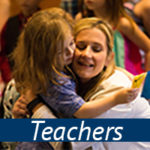St. John’s Curriculum is designed to encourage growth in multiple areas with particular emphasis given to the achievement of the Pennsylvania Pre-K Learning Standards. Spiritual development is grounded in the readings and teachings of the Catechesis of the Good Shepherd and Godly Play.
St. John’s Preschool Curriculum is based on (2002) The Creative Curriculum for Preschool (4th Ed). Research over the past seventy-five years has provided a great deal
of information about how children learn. The application of this knowledge to teaching is what we call “developmentally appropriate practice” or DAP. Developmentally appropriate practice means teaching in ways that match the way children develop and learn. A developmentally appropriate curriculum is both age appropriate and individually appropriate. Children are given opportunities to learn and practice newly acquired skills and offered challenges just beyond their level of present mastery in the context of a community where children are safe and valued, and where their physical and emotional needs are met.
The Creative Curriculum is a guide to establishing a developmentally appropriate program. The classroom is organized into interest areas: Blocks, Dramatic Play, Toys and Games, Art, Library, Discovery, Sand and Water, Music and Movement, Cooking, Computers, and Outdoors. Interest areas offer multiple opportunities for children to explore, discover, and grow. Children are involved in learning, but also in the care and keeping of the classroom itself. This way they are helped to become independent and confident learners. The learning environment is the starting point for actually implementing The Creative Curriculum.
St. John’s is committed to providing a creative, nurturing and joy filled learning experience that encourages a strong sense of self-accomplishment in its children while they grow in the knowledge of God’s Love. Children will be engaged in studies on topics that interest them. Teachers will engage in an ongoing cycle of observing, guiding learning, and assessing children’s progress. Teachers will interact with children continuously and make decisions about when and how to respond to meet individual and group needs. Teachers will relate to children in positive ways and help them do the same with one another. This positive social climate helps children feel good about school while they learn to the best of their ability.
St. John’s views families as welcome partners in their child’s education. Parents are encouraged to volunteer their time and talents.

